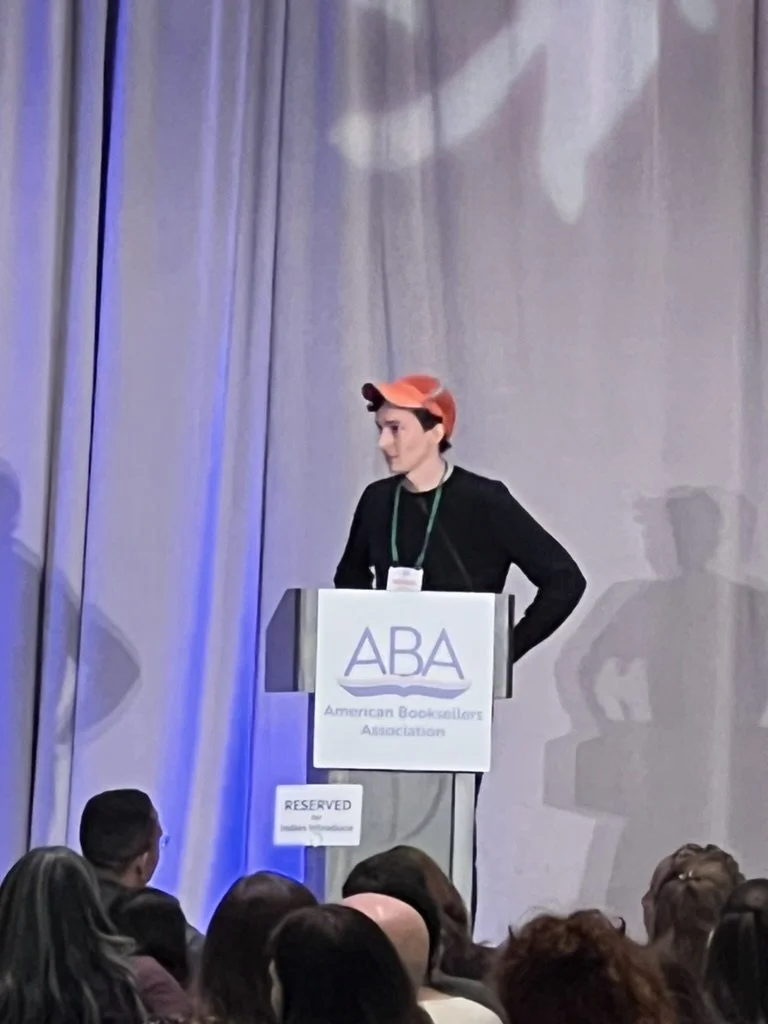JAMES ROBINSON SPEAKING
James Robinson is an Emmy-award winning filmmaker, video producer for New York Times Opinion, and the author of Whale Eyes: A Memoir About Seeing and Being Seen.
James is on a mission to help the world better understand disability. His presentations combine video, storytelling, and humor as they help students and adults to become enthusiastic authors of their own difference, as well as compassionate friends to their disabled peers.
With five starred reviews, Whale Eyes has been praised for its powerful message, captivating prose, innovative design and ground-breaking reading experience.
Speaking Menu
-
Good For: School assemblies (Middle to high school), libraries, book clubs. Ages 10 - Adult.
For most of my life, my eyes were the first thing people noticed about me and the last thing I wanted to talk about. In this 45-60 minute talk and film screening, I share the personal story behind Whale Eyes and the transformation it spurred. This presentation pushes students to empathize with their peers, as well as reflect on a little piece of their own being that the world might not understand. The talk combines personal anecdotes with an interactive discussion of how we can overcome our discomfort with disability. Ends with Q&A.
-
Good for: Freshman orientation week, documentary and journalism classes, creative festivals.
In this talk, I focus on the act of generating understanding through creative works. Anecdotes are drawn from my experience with Whale Eyes, as well as my Emmy-award winning disability series and work as a video producer for The New York Times. This talk focusses on how students and teachers can marry the practical reality of this media moment with their individual message. How do we generate understanding and compassion in a busy digital space? How do we frame our stories? By deconstructing Whale Eyes, I share strategies and storytelling skills that transform misunderstanding into connection. Depending on presentation length, screenings of additional films in the Adapt-Ability series can be included.
-
Good for: Teacher training, Classrooms of all ages.
Appropriate for teaching conferences or in classrooms from grade school to grad school, this lecture/film presentation revs up the audience to use Whale Eyes as both a text for discussing disability, as well a guide to creating independent documentary projects. By pushing students to identify a little piece of themselves that others might not understand, I discuss how to launch their message into the world using lessons from the book. We’ll discuss using tension, zeroing in on “precise moments,” delving into moments of “out-trigue,” and “inverting the narrative.” I enjoy addressing student works in any media, including text, audio, and video. The lecture can be tailored to fit the specific needs of teacher trainings or classrooms of varying ages.
-
Looking for something different?
I’m happy to adapt presentations to fit the needs of specific circumstances and events. Please contact me using the form above.
SPEAKING TESTIMONIALS
In my classes at Duke University, James draws on his fluency in multiple media to teach simple and engaging storytelling strategies. He then shows students how to trust their own perspective and use creative storytelling to turn personal challenges into powerful connections.
- Susie Post-Rust, Duke University
James Robinson’s documentary film Whale Eyes deeply resonated with our community and brought tremendous insight and inspiration to our Disabled Persons Day programming. With clarity, compassion, and honesty, James spoke about disability, identity, and the critical importance of visibility in media. His storytelling, both on screen and in person, was moving, and his ability to engage audiences with vulnerability and strength left a lasting impact.
- Lesley Levy, Bowdoin College
James Robinson always makes a big splash as a guest speaker in my classes because he zeroes right in on elements of disability that make people uncomfortable. He uses his own experiences to make people curious rather than defensive, and so he always sparks a lot of lively and genuine conversation. My students always find that his films and talks suddenly make ideas that they understood intellectually but didn’t care that much about into something a lot more real, relatable, and important.
- Claudia Rector, George Mason University Honors College
James is a generous storyteller and natural teacher. By sharing his own process and inspiration for filmmaking with my class of UCLA seniors, all novice filmmakers, James inspired them to craft stories of their own.
- Dr. Nadine Tanio, UCLA


